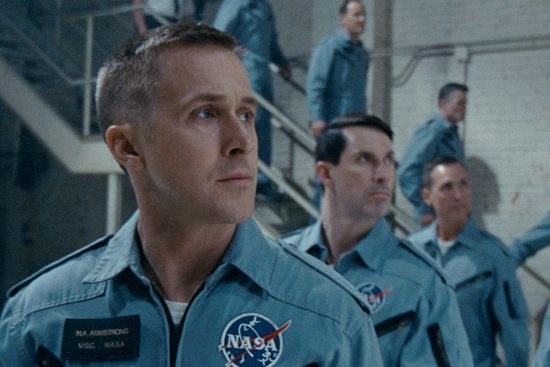IMAX Review: First Man
Ever since its world premiere at the Venice Film Festival at the end of summer, First Man, Damien Chazelle’s fourth feature film, has sparked a peculiar debate amidst overall positive reviews praising its technical achievements in filmmaking. This Neil Armstrong biopic based on James R. Hansen’s book was in fact accused of making a political statement by not showing the titular first man planting the American flag on the lunar surface on July 20, 1969.
The Oscar-winning director immediately clarified that his intention was aimed to make such an accomplishment feel more like a human endeavor rather than just one country’s success. And rest assured the film doesn’t spare the patriotic iconography across its lengthy running time or even a few jabs at the Russians, highlighting that good old American competitive spirit pushing for the success of the mission. Yet, we all take something different from a film’s viewing and for instance, Richard Brody intriguingly writes in the New Yorker that he actually perceived the film as “an accidental right-wing fetish object”.
I’m not politically savvy or even old and experienced enough to weigh in on the topic as eloquently as those seasoned writers but I am most certainly a rather emotional and empathetic person who knew nothing about Armstrong’s personal life and how it had affected his career path. That’s why I found Chazelle’s film an extremely moving character study about an emotionally constipated man who, due to his nature and the time he lived in, was prone to bottle up his feelings and dived into a potentially suicidal life-mission in order to cope with his inner darkness.
The filmmaker doesn’t waste time and establishes the film’s thematic thread since the very opening scene, where we find our protagonist testing an aircraft for NASA and almost dying in the process. The powerful contrast of cutting to his quiet family life where death doesn’t spare his 2 years old cancer-struck daughter is heart-wrenching. And the fact that this man is incapable of grieving unless he’s alone in his study and then proceeds to isolate himself more and more from his wife and his other two kids is as frustrating as it is emotional to witness.
Some of the criticism the film has received not just from journalists but also from viewers since opening in cinemas over a week ago, refers exactly to how Armstrong’s stubbornness into his emotional isolation is grating to watch, with many even finding Gosling’s portrayal as monotone. Personally, I thought the exploration of this man’s secluded inner journey was rather fascinating and touching and I feel like praising Ryan Gosling for capturing Armstrong’s self-imposed emotional exile in such a realistically unnerving way.
Claire Foy’s turn as Armstrong’s wife Janet is equally brilliant and deeply affecting. After more of Neil’s friends keep getting killed during tests or early missions, despite accepting what she got herself into, Janet refuses to play the concerned stay-at-home spouse and keeps challenging her husband to show up for his kids. The scene where she pushes Neil to take responsibility and explain to their children that there’s a high chance of him not coming back home from the mission is particularly intense despite its understated execution.
This time Chazelle directs from a script written by Oscar winning Josh Singer (Spotlight) but still gravitates around the familiar themes of our painfully obstinate obsessions that pervaded his previous films he also wrote (Whiplash, La La Land). Although being produced by his idol Spielberg, First Man struck me as the stylistic love child of Terrence Malick and Christopher Nolan. The intense and often harrowing family drama is reminiscent of some powerful moments in Malick’s The Tree Of Life, whilst the spectacular space action inevitably evokes the best scenes of Nolan’s Interstellar.
If like us, you’re able to experience this heart-pounding film in an IMAX cinema you’re in for a breath-taking treat when the story reaches its climax, since the lunar sequences were shot with IMAX cameras. In order to convey the analogic tech feel of the period the talented director has filmed the space scenes mostly with practical effects rather than relying heavily on digital. The result is truly outstanding, especially for his choice to keep us mostly inside the cockpit within the astronauts’ point of view and perception of all that’s happening rather than the typical panoramic wide shots of the rocket in space.
That adds to the realistic feel and the exceptional soundscape makes for a claustrophobic experience, which sends shivers down your spine and makes you realise how small we are within the mystery of the universe. Justin Hurwitz’s amazing score is almost an extra character in the story, taking us from the haunting strings pieces underlying Armstrong’s psychodrama to the epic heights of space travel’s scary leap into the unknown. Although the rest of the film was not filmed in IMAX, watching it on that kind of enveloping screen takes the cinematic experience of something so spectacular to the next level and immerses you even more into the emotional journey. Then of course when the actual IMAX sequences bookend the crescendo the filmmakers have expertly built up over the course of two hours, they are truly something to behold.
During the iconic moment when Armstrong spells out one of history’s most famous quotes – “That’s one small step for a man, one giant leap for mankind” – his words echo powerfully in our head. Yet it’s seeing him drop a memento of his beloved daughter in one of the lunar craters that hits us deeply in our hearts and hopefully makes us ponder what gives meaning to our lives. And then there’s that brief epilogue I won’t spoil, a small yet perfect moment that speaks volumes about what makes us human, which sums up why the film works on every level, especially the emotional one.
First Man is in IMAX cinemas now.











